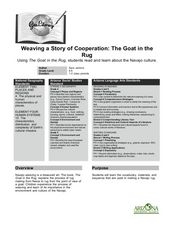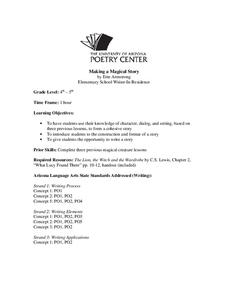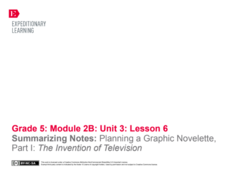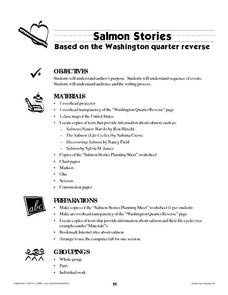Curated OER
Sequencing: Pictures Tell a Story
Students listen to a story and observe five illustrations of the main events drawn by the teacher. They arrange the illustrations in sequential order. Then, working in groups of five, they read stories and select five events, one for...
Curated OER
Body Sequencing
Fifth graders listen to a story told by their teacher. They have cards of all of the events in the story. They must "jump" into the correct order of events.
Curated OER
Write Me a Story
Second graders use the writing process and submit a story to www.kids.com. In this story writing instructional activity, 2nd graders choose a topic for a story contest. Students develop their stories. ...
Curated OER
Story Elements
Third graders identify story elements. In this story elements lesson, 3rd graders look at main idea, characters, point of view, theme and setting. They create a five paneled comic strip from a book.
Curated OER
Weaving a Story of Cooperation: The Goat in the Rug
Weaving is an important part of Navajo culture. Read The Goat in the Rug to your fourth and fifth graders, and give them a glimpse into the process of rug making from the point of view of a goat! They will learn new vocabulary words and...
Curated OER
Making a Magical Story
Fourth and fifth graders use their knowledge of developing character, dialogue, and setting to produce an original story. An excerpt from The Lion, The Witch, and The Wardrobe is used as inspiration to get everyone's...
Curated OER
Insects
It's a fact: kids love bugs! With this lesson, young learners explore reading informational texts and conducting research while learning about their favorite insects. Spark learners' interest by reading a book about one kind of bug and...
Curated OER
Summer Shorts
Want to use sequence maps in your narrative writing unit? Young writers work to create personal narratives about their summer vacation. They write a narrative of their vacation and create a display using summer clothing shapes made from...
EngageNY
Summarizing Notes: Planning a Graphic Novelette Part 1: The Invention of Television
What's the story? Learners create the first of four storyboards about the invention of the television, incorporating narrative techniques and descriptive details. Next, they offer and receive feedback by participating in a peer critique...
EngageNY
Grade 12 ELA Module 1: Unit 1, Lesson 1
Here's a fresh approach to the dreaded personal narrative required by most college applications. The Autobiography of Malcolm X is the anchor text for a unit that, through modeling and guided practice exercises, encourages the...
Guam Community College
Joseph Had a Little Overcoat
Spruce up a class reading of the children's book Joseph Had a Little Overcoat by Simms Taback with this fun series of activities. Starting with a list of reading comprehension questions and key vocabulary to address during a teacher...
Curated OER
Lesson Six: Story Elements/Inferring
Second graders practice the use of various story elements. In this story elements lesson, 2nd graders listen to the story All I See by Cynthia Rylant and look for the problem and solution in the story. They reread the book to create...
Curated OER
Dusty Locks and the Three Bears
Read this twist on Goldilocks and the Three Bears: Dusty Locks and the Three Bears by Susan Lowell. Kindergartners listen, predict, and discuss the story. They then participate in a dramatization of the story and draw a picture...
Curated OER
Different Strokes For Different Folktales
Young readers use graphic organizers, such as Venn diagrams and story maps, to analyze a variety of folktales and the elements of a story. They use writing, sequencing activities, and creative art to identify the morals learned from a...
Curated OER
Parts of the Plot: Constructing A Plot Diagram
After reading "The King of Mazy May" by Jack London, learners reinforce their literary analysis skills in this SMART board lesson. The provided SMART board file allows themto define elements of a short story, and then add it to the plot...
Curated OER
Primary Sources and Protagonists: A Native American Literature Unit
Introduce your middle schoolers to the lives of past Native Americans. First, learners work together to put photographs in a sequence. Then, using their sequence, they create stories to share with the whole class. No matter how old your...
Curated OER
Pumpkin Time
Students visit a pumpkin farm and discuss the characteristics of a pumpkin and how they grow. They create a class story about the trip to the farm with each student supplying a sequence for the story.
EngageNY
Grade 10 ELA Module 3: Unit 1, Lesson 1
Can people live forever? Scholars ponder the answer as they analyze an excerpt from The Immortal Life of Henrietta Lacks. As readers discover Lacks' immortal cells, they discuss how the author carefully sequences, connects and unfolds...
Hawaiʻi State Department of Education
Sequence of Events
Are you in need of a new way to teach learners sequence of events and how to interpret a character's external motivations? Why not engage them in dramatic play? The class will use tableaux to convey the sequence of events in a familiar...
Hawaiʻi State Department of Education
Making Dances From Stories
After reading a short story, learners will create dances that show homophones and verbs. Their dance sequences involve three verbs and transition movements in between each verb. Tip: Have the class dance out the sequence of events from...
Curated OER
Salmon Stories
Work on author's purpose with this instructional activity, which focuses on sequence of events and audience as well. Middle and high schoolers describe the 50 State Quarters Program for background information. After discussing the...
Curated OER
Comprehension Skills: Evaluate Using Fiction Stories and Aesop's Fables
Primary readers investigate several comprehension skills in the ten lessons of this unit. Forming opinions about stories, comparing stories to each other, using Venn Diagrams, and applying the ideas from a story to real life situations...
Hawaiʻi State Department of Education
Story Design
Stories contain very specific elements; plot, characters, and key events. Learners use pantomime to retell a key event from the beginning, middle, and end of a story. They discuss setting and character as each group discusses and then...
Curated OER
2nd Grade - Act. 04: What Time Is It?
How do you teach time? Using various stories, 2nd graders will learn about the concept of a daily schedule to develop a sense of self. They will complete a time of day chart and learn about the basic concepts of time beyond a minute....























